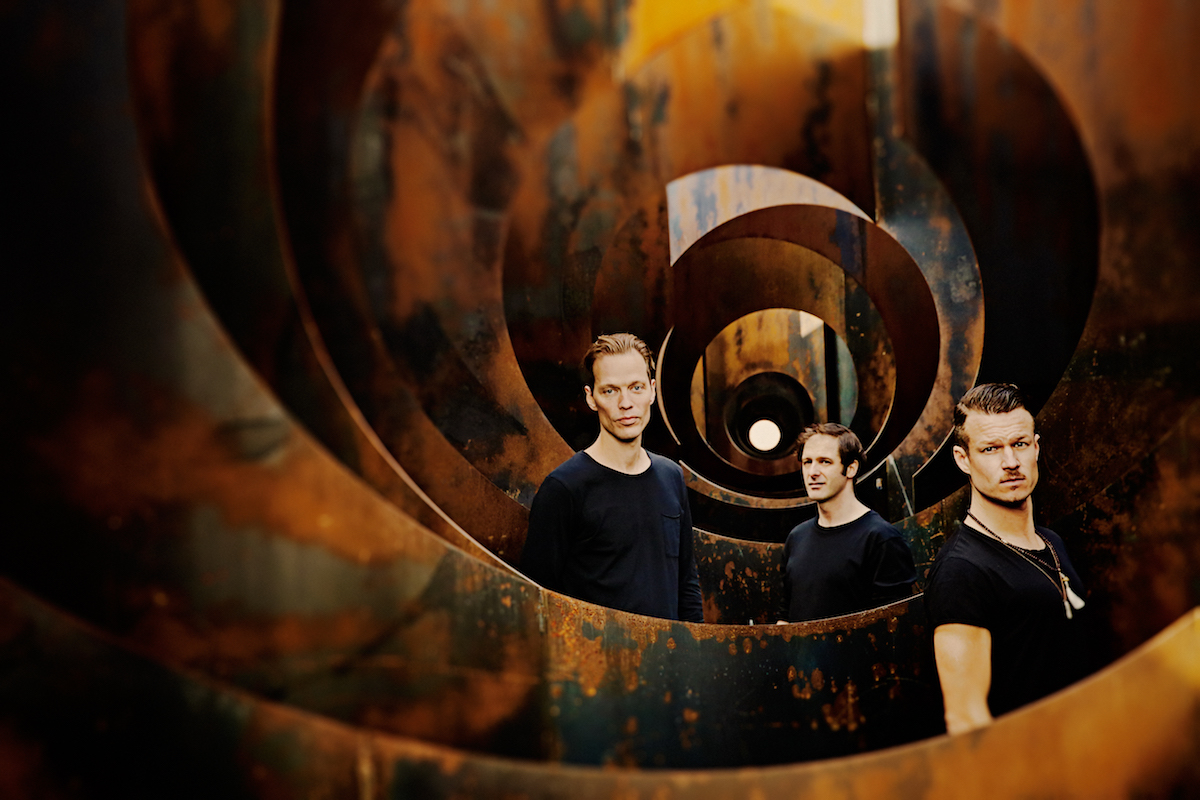Having been named Jazz Ensemble of the Year at the 2017 Parliamentary Jazz Awards, Phronesis have asserted themselves as one of the finest jazz groups in the UK. They began playing together in 2005, bassist Jasper Høiby recognising a strong connection between himself, pianist Ivo Neame and drummer Anton Eger. From the outset, the group had no outright leader and their democratic approach to music making has reaped astonishing rewards. As they enjoy what remains of the Summer, before beginning the German leg of their European tour in September, we spoke to Ivo, Jasper and Anton about their development as a trio, the social and environmental issues that weigh on their minds and the new music that has brought them joy this year.
Your last show at Band on the Wall, in June 2016, was astonishing. In the two years since, how have you developed as a trio? Have new interests or individual skills led you in particular directions?
Ivo: ‘We’re glad you enjoyed the gig! The way we are developing is by continuing to operate as a ‘band’ – it’s a joint effort to create a functioning democratic unit. The responsibilities in the band are shared equally on every level and this is the main reason why Phronesis are different from some other jazz groups; it’s not a one-man dictatorship. People come to hear Phronesis because of this co-operative dynamic. As individuals we all try to develop our craft as musicians and composers; for me this is the essence of being a jazz musician. Miles Davis said this: “People who don’t change will find themselves like folk musicians, playing in museums and local as a motherf*cker”. Well, folk is actually quite popular now and, given the state of the jazz scene, I think a lot of great jazz musicians would be happy to have a gig in a museum! We can’t take his words too literally because times have vastly changed since Miles was at the peak of his popularity (and by all accounts he was a borderline-psycho) but I still think there’s a lot of wisdom in what he says, both musically and also as an approach to life. Personally, I’ve always been interested in analogue synths and so I’m glad that one of the tracks on the forthcoming new Phronesis album reflects this.’
You have a clear concept behind your forthcoming LP, We Are All. Can you explain how that has guided the process, from the music making to the design of the physical copies?
Jasper: ‘I think that it was very important to us all that the message we send out should be one of positivity, simply because there’re so many depressing things going on at the moment.
The common discourse seems to cause huge division between us all, painting a picture of doom and gloom, whereas really we have so many things in common as people. We Are All is meant to reflect that interconnectedness, not only between humans, but also between us and all other things on this planet.’
Jazz trio history appears to stretch back to the early 1930’s. Is the history and lineage of the jazz trio something you have to be mindful of, in order to progress the form as you are?
Ivo: ‘We’re all fans of piano trios. Speaking for myself (because we all have different preferences) my favourite piano trios are Chick Corea trio (featuring Miroslav Vitous and Roy Haynes), Bill Evans trio (featuring Scott LaFaro and Paul Motian) and Keith Jarrett trio (featuring Gary Peacock and Jack DeJohnette). Now I regret singling out these trios because there are so many trios that I’ve been inspired by, but I’m not going to drone on with that info. What we’re doing as Phronesis reflects this lineage of piano trios but we differ because we are a democratic band. Jasper and Anton are both great writers and we always play tunes by the three of us on gigs. We are all influenced by a lot of music that couldn’t be defined as jazz and consequently these influences filter osmotically into the music we write as composers. Jazz musicians have a responsibility to know and understand great music from the past and then do something original with that understanding (if they want to call the music that they play jazz, that is). Trying to define what jazz is makes me think of Schrödinger’s cat – it can be both alive and dead depending on who’s looking!’
Ivo, you’ll be visiting Band on the Wall with Julian Arguelles’ ensemble, prior to the Phronesis show. Does your playing benefit from being part of a number of projects? What has been the most enjoyable aspect of your work with Julian, both in his group and on The Behemoth?
Ivo: ‘I think playing with other groups than Phronesis only strengthens the musical skills of each of us. Julian is a very experienced player and writer and I have learnt a lot from playing with him over the years. I first started playing with him in Mick Coady’s band in 2012 and I found his uncynical approach to playing other people’s original music refreshing. The willingness and patience to give original music a go is the lifeblood of the scene and I’m very happy to play with a lot of musicians who have this attitude.’
Jasper, we’ve seen that environmental issues are of concern to you. Were those issues an influence on the natural photography we see used on the album? Does an awareness of environmental damage have a wider impact on your life?
Jasper: ‘Yes and yes! Environmental issues are of great concern to me on a daily basis and I believe many of these issues are starting to have a direct impact on all of our lives. One of the ideas behind the album title and artwork was to create awareness of the interconnectedness of all things on this planet. We, as humans, are directly dependant on the planet’s resources, and the nature and animal photos are about getting that message across. The fish photograph is taken by an incredible nature photographer called Anuar Patjane, who has dedicated his life to capturing the wonders of the natural world with his camera, and he constantly expresses the urgency of preserving it. It made perfect sense to include his work as part of the message.’
Anton, we see you’re using a less conventional drum setup on the One For Us video: a piccolo snare in place of the rack tom and an array of varying cymbals. How much experimentation went into the setup you have for this current album and tour?
Anton: ‘A couple of years ago I removed all cymbals but the hi-hat and the 26” ride and played a whole year with only that setup. I enjoy some radical changes every now and then to stir things up, change the sound and my way of getting around on the kit. It helps me to clean up my playing and give me a new starting point where I can potentially start adding new cymbals, drums or other sounds.’
Finally, we’re at that point in the year where publications select their favourite records of the year, so far. Do each of you have any favourite records that have been released this year?
Ivo: ‘Enemy (Kit Downes, Petter Eldh and James Maddren) have made a strong eponymous album for Edition Records earlier this year. There’s also an interesting album called Bartók Impressions on the Hungarian BMC label by Matyas Szandai, Mathias Levy and Miklos Lukacs. Finally, my friend Dave Manington has made a unique album released on Loop Records called Challenger Deep – I’m a bit biased unfortunately because I played on this one; only mentioning it ‘cos of the beltingly-good tunes!’
Jasper: ‘For Gyumri by Tigran Hamasyan is a very beautiful album. Craig Taborn’s Daylight Ghosts is totally awesome and also Mark Lockheart is bring out an album featuring a quintet plus an Orchestra on Edition Records next year which I’ve heard snippets of, and it sounds ridiculous!’
Anton: ‘I’m quite into The Internet’s new album Hive Mind at the moment. Also, there’re some enjoyable bits on the R+R=NOW album Collagically Speaking. J. Cole’s KOD is killing!’





